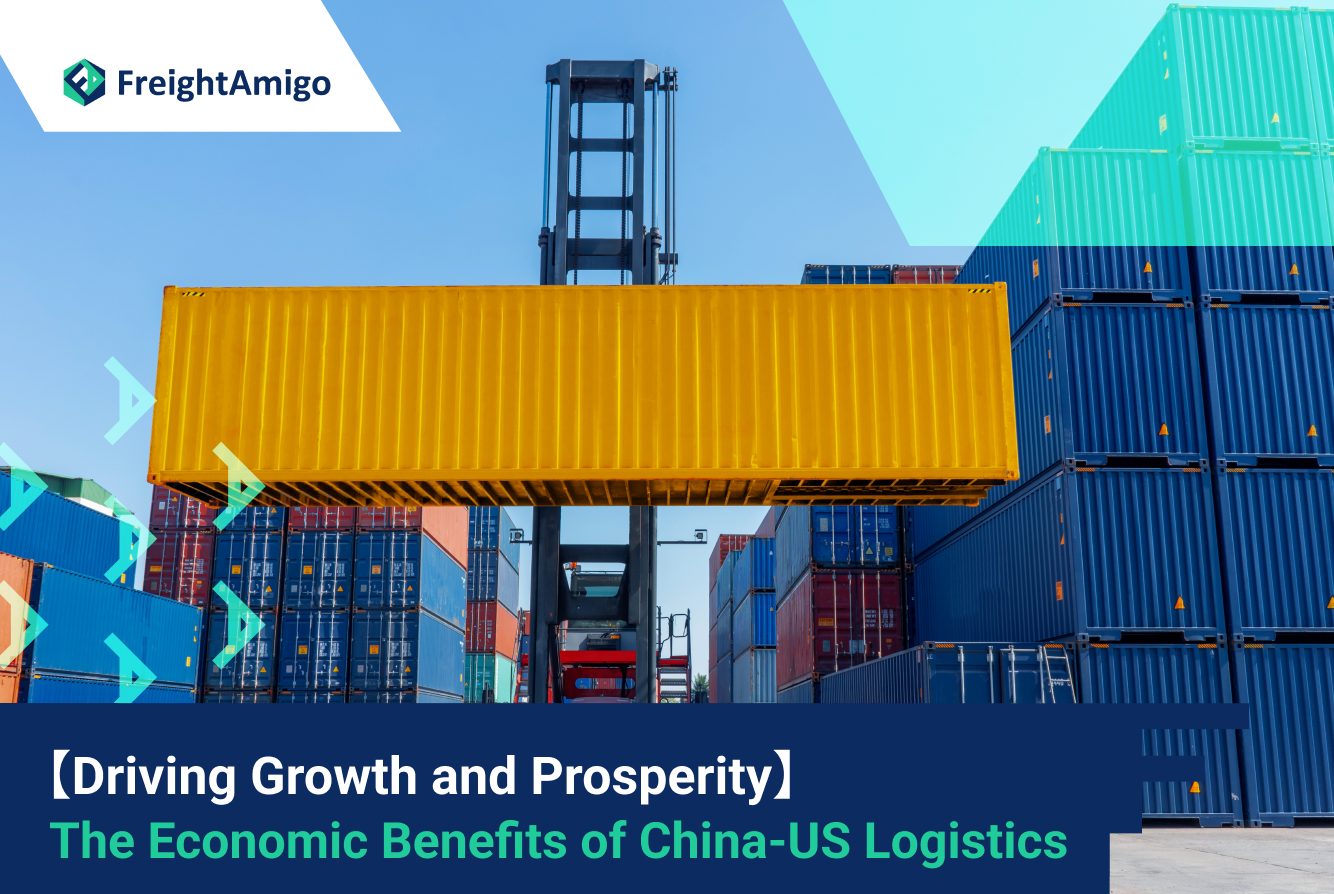Author Name: Tiffany Lee – Marketing Analyst at FreightAmigo
The economic benefits of the logistics relationship between China and the United States are vast and impactful, contributing to the growth and prosperity of both nations. The seamless movement of goods, supported by well-developed transportation networks, efficient supply chain management, and collaborative partnerships, has resulted in numerous advantages. This introduction will explore the key economic benefits derived from the China-US logistics connection, including trade expansion, cost savings, job creation, market access, foreign direct investment, and technological advancements. By examining these benefits, we can gain a deeper understanding of the pivotal role that logistics plays in driving economic growth and fostering mutually beneficial outcomes between these two economic powerhouses.
Want To Compare The Best Express, Air Freight, Sea Freight, Rail Freight & Trucking Rates So As To Have Better Control On Cost?
The Role of Efficient Logistics Networks in China-US Bilateral Trade Expansion
The efficient logistics networks connecting China and the US play a pivotal role in supporting and expanding bilateral trade between the two nations. These logistics operations streamline the movement of goods, resulting in reduced transportation costs, shorter lead times, and minimized trade barriers. By ensuring a smooth flow of goods, logistics networks facilitate increased trade volume and value, fostering economic growth for both countries. Importers and exporters benefit from optimized supply chains, enabling them to meet customer demands more effectively, explore new markets, and capitalize on business opportunities. The seamless logistics operations between China and the US contribute to the deepening of trade ties and the mutual prosperity of both economies.
Cost-Saving Impact of Well-Developed Logistics Infrastructure
Businesses benefit from well-developed logistics infrastructure and optimized supply chain management, resulting in significant cost savings. Streamlined transportation, warehousing, and distribution processes play a key role in reducing operational expenses, enhancing overall profitability, and bolstering competitiveness. Efficient logistics operations minimize transportation costs by optimizing routes, consolidating shipments, and utilizing cost-effective modes of transportation. Additionally, optimized warehousing and distribution processes reduce storage costs, inventory holding expenses, and minimize the risk of stockouts or overstocking. By achieving cost savings through efficient logistics, businesses can allocate resources more effectively, invest in growth opportunities, and offer competitive pricing, ultimately strengthening their market position and driving sustainable profitability.
Strengthening Business Market Access through Efficient China-US Logistics Connections
The establishment of strong logistics connections between China and the US significantly enhances market access for businesses in both countries. With efficient transportation and distribution networks, companies can tap into a broader customer base and expand their market presence. Streamlined logistics operations enable timely and reliable delivery of goods, ensuring that businesses can reach their target markets effectively. Expanded market access not only drives revenue growth but also allows companies to gain a larger market share, increasing their competitiveness and fostering long-term sustainability. By leveraging robust logistics connections, businesses can seize new opportunities, explore untapped markets, and establish lasting relationships with customers, ultimately driving economic growth and prosperity.
The Role of Logistics in Job Creation and Economic Growth
The robust logistics activities between China and the US not only facilitate the movement of goods but also generate significant employment opportunities, driving overall economic growth. The logistics sector plays a vital role in job creation, offering a diverse range of roles from transportation providers and warehouse operators to customs brokers and supply chain professionals. As logistics operations expand, more jobs are created, benefiting individuals and communities. Moreover, the multiplier effect of increased employment in the logistics sector stimulates consumer spending, fosters entrepreneurship, and supports ancillary industries. By fueling job creation and economic growth, the logistics sector contributes to the prosperity and well-being of both nations.
Driving Foreign Direct Investment through Efficient Infrastructure and Supply Chain Reliability
An efficient logistics infrastructure serves as a magnet for foreign direct investment from Chinese and US companies alike. A well-connected logistics network enhances supply chain reliability, mitigates operational risks, and significantly boosts the attractiveness of both countries as investment destinations. With streamlined logistics operations, businesses can benefit from improved inventory management, reduced transit times, and enhanced visibility throughout the supply chain. These factors not only minimize costs but also instill confidence in investors, as they witness the seamless movement of goods and the facilitation of trade. The presence of a robust logistics ecosystem positions both China and the US as favorable locations for foreign direct investment, fostering economic growth, and driving cross-border business collaborations.
Effective Logistics Management in Enhancing Productivity and Market Competitiveness
Effective logistics management is a key driver of productivity and competitiveness for businesses. Streamlined processes, optimized inventory management, and timely delivery of goods enable companies to meet customer demands efficiently, gaining a competitive edge in the market. By leveraging well-developed logistics networks, businesses can reduce lead times, minimize stockouts, and improve overall operational efficiency. This allows them to respond quickly to market changes, capitalize on emerging opportunities, and expand their market share. Moreover, efficient logistics operations facilitate cost savings, enabling businesses to offer competitive pricing while maintaining profitability. By enhancing productivity and competitiveness, effective logistics management empowers businesses to thrive in a dynamic and competitive business environment.
Conclusion
The logistics relationship between China and the United States brings substantial economic benefits, driving growth and prosperity for both nations. Streamlined logistics operations expand bilateral trade, reducing costs and trade barriers, and enabling businesses to explore new markets. Well-developed infrastructure and optimized supply chains lead to cost savings, enhancing competitiveness and profitability. The logistics sector generates employment opportunities, stimulates economic growth, and supports ancillary industries. Efficient logistics connections attract foreign direct investment, instilling confidence in investors. Additionally, effective logistics management improves productivity and market competitiveness for businesses, allowing them to meet customer demands efficiently. Overall, the China-US logistics relationship fosters economic growth, job creation, market access, and technological advancements, contributing to the long-term success of both countries.
There Are Different Options For Cargo Transportation. If You Want To Choose The Most Convenient And Suitable Solution, It Is Best To Have The Full Support Of Logistics Experts! If You Are Planning To Ship Goods Overseas, Please Go To The FreightAmigo Page For Inquiries.
===
Read More:
【Logistics News】Singapore to Sign Declaration on Green Shipping Corridors
FreightAmigo Won Startup Grand Award In TechChallenge — Digitising Trade Finance
Sailing Schedule: Streamlining Logistics Operations for Efficient Shipments
===
If you have any inquiries on logistics/supply chain, feel free to contact FreightAmigo now:
Chat with us online OR
Phone : +852 28121686
WhatsApp: +852 27467829



